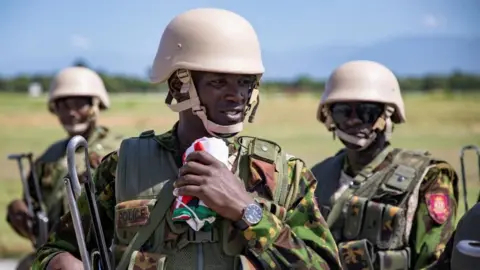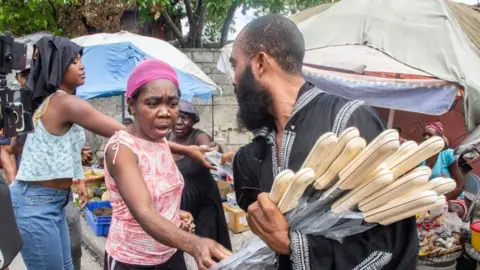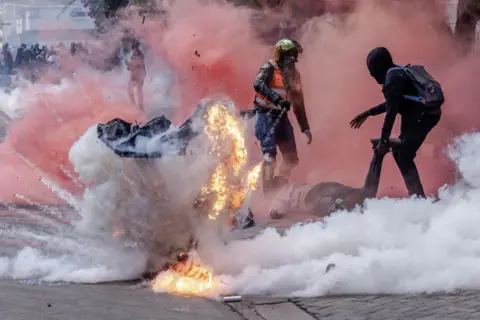Through Marina Daras, Gloria Aradi and Pascal Fletcher, BBC Information and BBC Tracking
 reuters
reutersHaiti’s top minister, Gary Connell, has vowed to end the chaos with the help of a Kenyan-led world force deployed to the Caribbean.
Mr Connell said the arrival of 400 Kenyan police, as part of the first tranche of World Troops, was a “unique opportunity” to defuse the situation.
“I would like no one to remain in a state of indecision regarding the purpose of this undertaking. The situation will reenergize and reaffirm its authority so that all Haitians can live in peace in this country,” he said.
The Caribbean nation, rocked by decades of instability, has seen a surge in violence since the assassination of President Jovenel Moise three years ago.
US President Joe Biden also welcomed the deployment, saying the Kenya-led mission offered the “best hope” for achieving democratic governance in Haiti.
But there is strong opposition to the deployment in Kenya – and not just because of allegations of police brutality in their own country, the latest example of which Fatal firing of protesters In the capital Nairobi on Tuesday.
The unrest in Nairobi came a day after President William Ruto sent off the officers in what he described as an “ancient” mission of solidarity.
Rival armed groups seized control of the capital Port-au-Prince earlier this year, forcing Prime Minister Ariel Henry to resign weeks later.
Armed gangs now control an estimated 80% of the city.
The United Nations says “powerful means of pressure” are needed to deal with them, which has approved a police mission made up of 2,500 officers from different countries – including the 1,000 officers ordered by President Ruto, although so far Only 400 have been deployed.
Working with Haitian police, and headquartered at a US-built base, Kenyan authorities will aim to retake key sites that are under gang control, including nearby airports and sea ports.
There have been no elections in Haiti since 2016. Elections are therefore to be held within a year, and to allow that to happen, a Kenyan-led mission is being tasked with restoring security.
Their deployment has been authorized for one year, which will be reviewed after nine months.
How dangerous are gangs in Haiti?
An average of more than one person per hour was killed or injured in gang violence in the first three months of this year, according to UN data.
According to the UN migration agency, about 600,000 Haitians have been forced from their homes.
In some places schools and police stations have been converted into shelters by families fleeing the violence.
Haiti’s police force has just 9,000 officers. In contrast, it is estimated that at least 8,000 Haitians belong to 200 or more armed gangs – with roles ranging from commanders to informants. Recruitment has increased in recent years.
Emmanuel Paul, a security consultant who works with humanitarian groups in Haiti, says gangs now have as much firepower as the police.
“There are pretty much the same types of guns everywhere – old assault rifles, various types of AK-47 Kalashnikovs,” he told the BBC.
Colombia’s President Gustavo Petro has also accused his country’s military of selling missiles and ammunition to armed men who could smuggle them into Haiti.
Why is Kenya doing this?
 getty images
getty imagesMr Ruto says, “We are doing this for the people of Haiti. The duty to protect in Haiti is a shared duty.”
But critics say Kenya is merely acting on the orders of the US and hopes to curry favor with the superpower, especially on the security front.
on one Recent trip to WashingtonMr Ruto also noted his desire to boost Kenya’s international standing in the region.
The US’s designation of the East African country as a major non-NATO ally has certainly achieved that.
But at home, President Ruto faces fierce opposition and Kenya’s High Court has ruled that the deployment is unlawful. Earlier there was delay in arrival of officials.
The court said that the Kenyan government has no authority to send police officers abroad without prior mutual agreement.
Such an agreement was signed on March 1, but opposition party Thirdway Alliance Kenya has filed a new lawsuit, arguing that the deployment violates the law.
“This project is sanctioned by the United Nations (UN). The request came from the United Nations and the United States. There is no request by Haiti, nor is there anyone who is capable of establishing a park,” says Charles Midega, the petitioners’ lawyer. Are.
“The President has not followed procedure consistent with the Kenyan Charter and the rules of deployment. And most importantly, the President has not gazetted Haiti as a reciprocating nation as a pre-requisite for deployment.”
Are Kenyan police prepared for such a mission?
Although Kenya has a history of participating in peacekeeping missions, its police force has never ventured outside Africa.
It is believed that the deployed unit will come from the General Service Unit (GSU), a paramilitary wing that is often deployed during demonstrations and terrorist attacks.
It had not been used before against international criminal networks such as Haitian gangs.
But the Kenyan government said deployed officers had received special training, including lessons in French and Haitian Creole, to ease communication with their counterparts.
Another hurdle in sight will be the chain of command.
“Kenyan police are deploying, but other countries are also sending contingents,” Mr Paul says.
“That is becoming the primary headache of the task – figuring out how to coordinate with the police and the military, given that they have other coaching backgrounds and other missions involved.”
Newly appointed Commander Godfrey Otunge will lead the Kenyan taskforce and will have a big task on his hands.
How effective are Kenya’s police?
 AFP
AFPKenyan police officers have long been criticized for human rights violations, and several rights groups have expressed concerns about their deployment to Haiti.
On Tuesday, police in Kenya’s capital Nairobi were accused of using live rounds against anti-tax hike protesters.
The Kenya Medical Association said at least 13 people were killed.
Mr Ruto defended the police, saying that “genuine” protests were “hijacked by a group of organized criminals.”
In a letter to the UN Security Council last August, Amnesty International highlighted the Kenyan police’s record of excessive use of force.
It also accused Kenyan police of killing dozens of protesters last year and unlawfully arresting and detaining others.
But police chief Japhet Koum denied this and accused opposition politicians last year of placing bodies hired from mortuaries at protest sites to cover up the deaths of their own personnel.
How have previous foreign interventions in Haiti fared?
Haiti has seen three major peacekeeping missions in the past 30 years, all of which failed to stop the crisis from getting worse.
In 1994, approximately 25,000 military personnel from Caribbean countries were sent as part of a UN-ordered operation.
Ten years later, 9,000 UN peacekeepers, known as MINUSTAH, were dispatched under the leadership of Brazil.
This time, it is believed that the UN-mandated task force will have a maximum of 3,000 officials, including civilian contractors deployed on site for logistical support.
Haiti’s Transitional Presidential Council recently appointed Mr. Conille, a former prime minister, to lead the country until elections can be held.
Haitians have seen peacekeeping missions come and go, but no stability has been achieved.
They might be expecting a different result this time.
Additional reporting by Natasha Booty
Indistinguishable Stories:
 Getty Pictures/BBC
Getty Pictures/BBCDiscover more from news2source
Subscribe to get the latest posts sent to your email.





